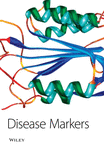Polymorphism in the KCNA3 Gene Is Associated with Susceptibility to Autoimmune Pancreatitis in the Japanese Population
Abstract
Autoimmune pancreatitis (AIP), characterized by irregular narrowing of the main pancreatic duct, swelling of the pancreas, and histological evidence of lymphoplasmacytic inflammation by high serum immunoglobulin G4, is distinct from ordinary pancreatitis. However, genetic factors involved in the etiology and pathophysiology of AIP remain unclear. Sixty-four patients with autoimmune pancreatitis (53 men, 11 women; mean age, 62.4 years) and 104 healthy Japanese controls were enrolled in this study. We performed an association analysis using 400 microsatellite markers with an average spacing of 10.8 cM in the genome. We also evaluated the association of AIP with seven single nucleotide polymorphisms (SNPs) within the 20-kb region around the potassium voltage-gated channel, shaker-related subfamily, member 3 gene (KCNA3). We identified six statistically significant markers (D1S2726, D5S410, D6S460, D10S548, D15S128, and D20S186; P < 0.05) related to susceptibility. The surrounding region showing the strong association (P = 7.4 × 10−7, Pc = 0.0015) contained the KCNA3 gene. Further analysis by SNP genotyping in KCNA3 gene revealed that four SNPs (rs2840381, rs1058184, rs2640480, rs1319782) were significantly associated with the AIP susceptibility (P < 0.007). KCNA3 is known to be involved in immunomodulation of autoreactive effector and memory T cell–mediated autoimmune diseases. Our findings provide the first evidence that KCNA3 is associated with AIP and suggest that KCNA3 may influence the risk for AIP.




